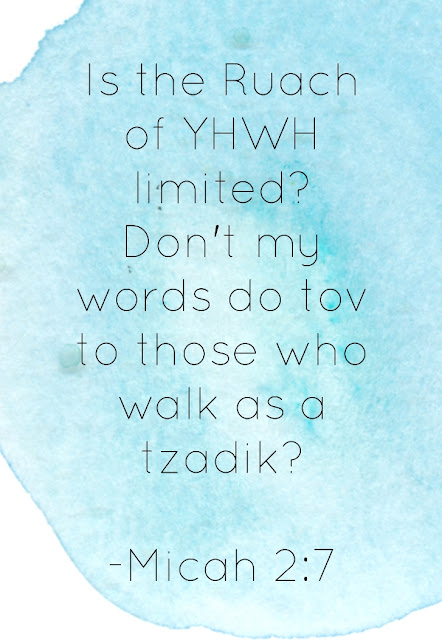We have heard so much about the Proverbs 31 woman who does it all. She is the golden girl of the Bible. While we don't hear much about ladies like Ruth, Tabitha, Mary, Abigail, Shiphrah, Puah, Huldah, Leah, or Jael we know the job description of Proverbs 31 all too well. One cursory reading of her accomplishments can feel wholly overwhelming. We have heard that it's a checklist and felt overwhelmed at the amount of things to do. Get up early. Go to bed late. Work all day. Make clothes. Invest money. Cook the meals. Plant a vineyard. Help the poor. Sew a quilt.
Did you know this is not how YHWH intended this passage to be read? A lot of this poem gets lost when it is translated into English and the several thousand years between when it was written and the present hasn't helped either. I think it's time to set aside this view of Proverbs 31 and take a look at it from a Hebraic perspective.
Did you know this is not how YHWH intended this passage to be read? A lot of this poem gets lost when it is translated into English and the several thousand years between when it was written and the present hasn't helped either. I think it's time to set aside this view of Proverbs 31 and take a look at it from a Hebraic perspective.
A couple of things we miss:
This is a poem, not a to do list.
Eshet chayil usually gets translated something like, "virtuous woman," "good wife," "a capable wife," or a "wife of noble character." And this really, really shortchanges this poem. Firstly it should be translated woman or female, as in whether or not you are married. Second, chayil would be better translated as valor (you know, how they translate the word when they talk about men). Other meanings of chayil include strength, ability, wealth, and force.
When was the last time someone encouraged you to get out there and be a force?
Eshet chayil = a woman of valor.
Verse one of the chapter starts mentioning that King Lemuel's mother told it to him. Not to his sisters. Not to her daughter in law. To him. So right off the bat we can tell that this is not a list of instructions or a checklist of what to get done in a day. In fact, each line of the poem (starting in verse 10) starts with a letter of the Hebrew alphabet. Sort of like, 'A is for Awesome, B is for Brilliant, C is for Courageous,' except much more eloquent.
But why is she telling this to a male? Verse 1 also mentions that his mother used this to discipline him. I don't know about you but I have one guess as to when this reprimand came out. We don't know for sure, but it sounds like when Lemuel was disrespectful his mother made him listen to this. When he was rude to a female servant or teacher she told him this. When he picked on his sisters or an aunt, this got brought up. Can't you hear the frustrated yell of a mother, "Who can find a woman of valor?! Are you kidding? Look around you, we're everywhere!"
In traditional Judaism, Eshet Chayil is used to praise a woman of valor before the Shabbat meal. It is said or sung by the husband or father in the household to his wife and daughters. He does it to praise them. He is not handing out things to do (it is Shabbat, after all), or pointing out the areas the women fell short in this week. He is praising them.
That's what the queen mother was doing too. Praising women of valor. She was not only pointing out how hard the women in his life worked, but that they did it with excellence and deserved to be praised. And that's what she was teaching her son as well. To praise the women in his life. It's time we took back eshet chayil and woman of valor and used them to compliment each other.
Make your first Etsy sale? Eshet chayil. Decide to finish your degree? Eshet chayil. Get your Shabbat prep done an hour ahead of time? Eshet chayil! Go for a run today? Eshet chayil. Make all your free throws in a basketball game? Eshet chayil. Accomplish your goal of reading the Bible in a year? Eshet chayil! Publish your first article? Eshet chayil.
This is not a checklist. Just as examining the life of a friend is a celebration of her accomplishments and talents, not a to do list for me. Can I be inspired by her? Absolutely. Do we have a few things in common? Probably. Should I attempt to squeeze her daily schedule into mine? No, thank you! In fact, the only instructive statement is in the very last verse. Proverbs 31:31 tells us to, "Honor her for what she has done." We should honor the women of valor in our lives (including yourself!) because YHWH does. Whether or not things have gone smoothly this week, YHWH praises you for the time, energy, and creativity you spent to bless your family and friends, to study His Word, and to practice righteous living. Even when things don't turn out perfectly! That's what YHWH does and that's what he is asking both women and men to do. To stop and say, "Eshet chayil." You are a woman of valor. You have ability. You are strong. You are a force. Eshet chayil.












